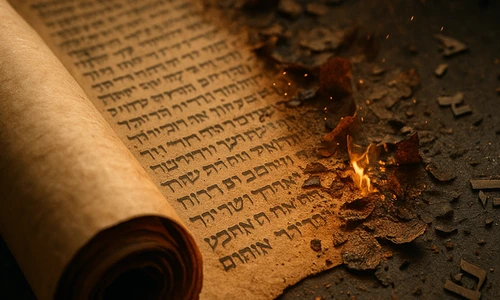Is Esther an Advent Story?
Let me tell you a familiar story.
The Jews are in bondage to a massive, world-spanning foreign empire. Enter a young Jewish woman, a virgin. She is called to be the linchpin of the salvation of her people. Initially skeptical, she accepts her place and sets herself to defy that empire in whatever way is necessary.
In this empire is an enemy, one that is outwardly righteous and loyal, and therefore exalted, but is looking to maintain his position at any cost, including murder.
The young woman has a relative, a man of the line of the kings of Israel. Because the man would not bow to the king of the empire or acknowledge the enemy’s rank, the enemy purposes to kill the man. The enemy constructs a monstrous instrument of torture and death in a public place where everybody would see the man as he died.
However, God intervenes, and the impossible happens.
Instead of killing the man, the enemy finds himself destroyed. Instead of dying, the man is glorified and seated at the right hand of power. God’s people are not destroyed, but neither are they rescued from their bondage the way they had hoped. They are saved from death, but remain where they are.
Forever after, the Jews celebrate this salvation with a yearly holiday and feast.
The post title probably gave it away, but this is not the Advent/Christmas/Easter story. Instead, this is the story of Esther and Mordecai, Xerxes, and Haman, and it happened almost five hundred years before Jesus was born.
The Jews are in exile in the Persian empire. Sure, some of them had been allowed to return and rebuild the temple in Jerusalem and the city walls, but the Jews were still scattered around one of the largest empires the world had ever known.
Esther is the young, beautiful virgin. She must be all of those things, or the eunuchs would not have invited her to become part of King Xerxes’s harem. She finds herself in a position to save her people, but only at extreme risk to herself. She knows that if she even asks for an audience with Xerxes, he could have her killed. Yet she eventually asks the Jews for [prayer and] fasting and then declares, “I will go in and see the king. If I must, die, I must die.” (Esther 4:16)
Okay, it’s not the Magnificat, but it’s also not all that far from Mary’s declaration to Gabriel: “Let it be to me as you have said.” (Luke 1:38) Mary knew that if she were found pregnant before marrying Joseph, the law declared her life forfeit. (Deuteronomy 22:20–21) Similarly, Esther’s acceptance of the risk of death gives her the power to defeat Haman and save her people.
What about Mordecai? He’s a descendant of Kish, King Saul’s father, which means he’s part of the royal line of Israel. (Esther 2:5–6) Just… not the Davidic line of Israel from whom the Messiah is promised. So close!
The entire plot hinges on Haman’s attempt to murder him (and all the Jews) because… he’s too good a Jew? He refuses to bow to Haman; as a Jew, he should bow only to God. I am reminded that one should “Render unto Caesar what is Caesar’s, but render unto God what is God’s” (Mark 12:17) and not get the two confused.
Likewise, Jesus’s refusal to play nice with the under-powers of the Roman empire—in particular, the Sadducees, who like Haman wash the outside of the vessel but leave the inside dirty and corrupt (Matthew 23:25)—results in a plot to murder Him.
So Mordecai is not Messiah, but the unsuccessful attempt to murder him for crimes he didn’t commit results in his glorification to the right hand of King Xerxes (Esther 9:4) and the salvation of his people (Esther 9:5).
Okay, how about the Jews? They’re oppressed, as always, but in this case by Persia instead of Rome. Through the actions of Esther the virgin and Mordecai the son of the king, they end up more powerful and more prosperous than they could possibly have wished for, especially in the king’s favored city (Susa, not Jerusalem). Esther and Mordecai save them from certain death.
That’s not exactly the gospel story, but in the first century AD when the Jews were just hoping not to die in Rome, Jesus announced that He would save them from sin and death. He did not change their station, but instead gave them spiritual power and prosperity of a kind they had forgotten how to hope for. He saves not from physical death but from spiritual death. And in response, we feast! For Esther and Mordecai and the Jews, the feast is called Purim; for Mary and Jesus and the Christians, the feast is called Christmas (or Easter, depending on which end of hope you’re looking at).
Haman is outwardly righteous, doing everything to please the king, but inside he is corrupt. Like the Sadducees, he’s willing to murder to maintain his position. Unlike the Sadducees, he’s also willing to kill all the Jews, not just the one causing problems.
Xerxes presents a bit of a mystery in this metaphor I’m drawing. Sometimes he’s the over-king, issuing decrees for the Jews’ life and death; he somewhat plays the role of God. But sometimes he’s Pilate, the oblivious instrument of Haman, who doesn’t really have a dog in the fight but goes along to keep the peace. Roughly speaking.
Maybe I’ve pushed this analogy as far as it can go.
Getting to Delight
So is Esther an Advent story? One of hope for a coming enduring salvation from God through a virgin and a king?
Well, it sure sounds like it to me, and you don’t even have to squint that hard.
I admit it was a little disingenuous calling Esther a virgin, because that’s not how we think of her, but we know she was. And sure, Mordecai was part of the family of the wrong king—the first king of Israel, not the last. (Plus, you know, he’s not God.) Haman isn’t Annas (although Annas in Hebrew would have been Hanan, which is awfully close). Xerxes… well, I already said Xerxes doesn’t fit super well.
I don’t think the author of Esther1 wrote the book as a prophecy of Messiah. But from this side of history, the parallels are intense.
God saves His people over and over again, regardless of whether the enemy is a single person or a massive empire. He chooses the ones He chooses, whether they are kings or young women. In the Advent season, as we look forward to the permanent salvation of all of God’s people, remember not only Mary and Jesus but Esther and Mordecai, and be hopeful.
Oh. One more thing. Remember how the eastern wise men found Jesus in the manger by following a star (Matthew 2:1–2)? Xerxes’s wise men, probably from a similar homeland, searched the kingdom and found a woman named Hadassah, whose name means “myrtle”—as in the trees of peace from Zechariah 1:11. But the wise men weren’t Hebrew; they were Persian. And the Persian version of her name is Esther, which means… star.
Merry Christmas!



